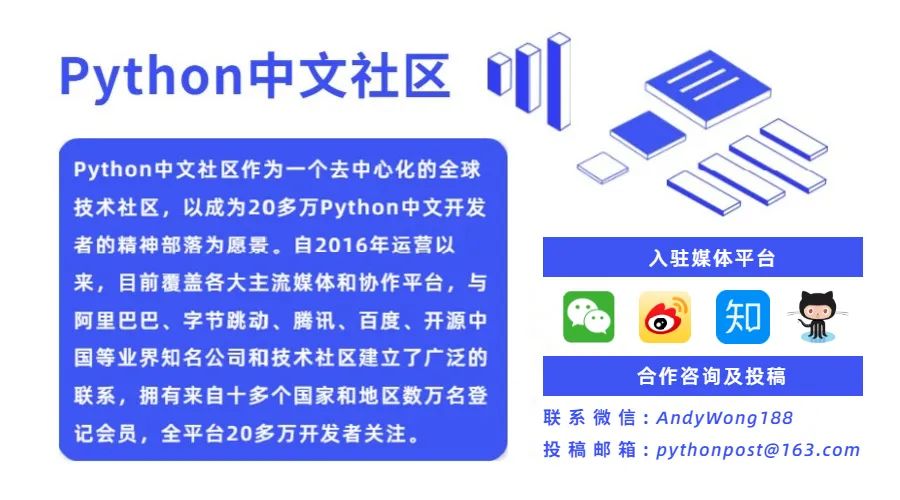用 Python 创建你自己的 Shell

subprocess.run对其自身进行延迟求值并保存结果。import subprocess
class PipePy:
def __init__(self, *args):
self._args = args
self._result = None
def _evaluate(self):
if self._result is not None:
return
self._result = subprocess.run(self._args,
capture_output=True,
text=True)
@property
def returncode(self):
self._evaluate()
return self._result.returncode
@property
def stdout(self):
self._evaluate()
return self._result.stdout
def __str__(self):
return self.stdout
@property
def stderr(self):
self._evaluate()
return self._result.stderr
ls = PipePy('ls')
ls_l = PipePy('ls', '-l')
print(ls)
# <<< files.txt
# ... main.py
# ... tags
print(ls_l)
# <<< total 16
# ... -rw-r--r-- 1 kbairak kbairak 125 Jan 22 08:53 files.txt
# ... -rw-r--r-- 1 kbairak kbairak 5425 Feb 1 21:54 main.py
# ... -rw-r--r-- 1 kbairak kbairak 1838 Feb 1 21:54 tags
ls_l = PipePy('ls', '-l')
print(ls_l)
ls = PipePy('ls')
print(ls('-l'))
PipePy('ls', '-l')
PipePy('ls')('-l')
class PipePy:
# __init__, etc
def __call__(self, *args):
args = self._args + args
return self.__class__(*args)
ls = PipePy('ls')
print(ls('-l'))
# <<< total 16
# ... -rw-r--r-- 1 kbairak kbairak 125 Jan 22 08:53 files.txt
# ... -rw-r--r-- 1 kbairak kbairak 5425 Feb 1 21:54 main.py
# ... -rw-r--r-- 1 kbairak kbairak 1838 Feb 1 21:54 tags
ls传递更多参数,则可能会遇到--sort = size。我们可以轻松地执行ls('-l','--sort = size')。我们可以做得更好吗? class PipePy:
- def __init__(self, *args):
+ def __init__(self, *args, **kwargs):
self._args = args
+ self._kwargs = kwargs
self._result = None
def _evaluate(self):
if self._result is not None:
return
- self._result = subprocess.run(self._args,
+ self._result = subprocess.run(self._convert_args(),
capture_output=True,
text=True)
+ def _convert_args(self):
+ args = [str(arg) for arg in self._args]
+ for key, value in self._kwargs.items():
+ key = key.replace('_', '-')
+ args.append(f"--{key}={value}")
+ return args
- def __call__(self, *args):
+ def __call__(self, *args, **kwargs):
args = self._args + args
+ kwargs = {**self._kwargs, **kwargs}
- return self.__class__(*args)
+ return self.__class__(*args, **kwargs)
# returncode, etc
print(ls('-l'))
# <<< total 16
# ... -rw-r--r-- 1 kbairak kbairak 125 Jan 22 08:53 files.txt
# ... -rw-r--r-- 1 kbairak kbairak 5425 Feb 1 21:54 main.py
# ... -rw-r--r-- 1 kbairak kbairak 1838 Feb 1 21:54 tags
print(ls('-l', sort="size"))
# <<< total 16
# ... -rw-r--r-- 1 kbairak kbairak 5425 Feb 1 21:54 main.py
# ... -rw-r--r-- 1 kbairak kbairak 1838 Feb 1 21:54 tags
# ... -rw-r--r-- 1 kbairak kbairak 125 Jan 22 08:53 files.txt
ls = PipePy('ls')
grep = PipePy('grep')
print(ls | grep('tags'))
# <<< tags
__init__和__call__方法接受一个仅用于关键字的新_pipe_input关键字参数,该参数将保存在self上。_pipe_input,它将作为输入参数传递给subprocess.run。__or__方法以将左操作数的结果作为pipe输入传递给右操作数。 class PipePy:
- def __init__(self, *args, **kwargs):
+ def __init__(self, *args, _pipe_input=None, **kwargs):
self._args = args
self._kwargs = kwargs
+ self._pipe_input = _pipe_input
self._result = None
- def __call__(self, *args, **kwargs):
+ def __call__(self, *args, _pipe_input=None, **kwargs):
args = self._args + args
kwargs = {**self._kwargs, **kwargs}
- return self.__class__(*args, **kwargs)
+ return self.__class__(*args, _pipe_input=_pipe_input, **kwargs)
def _evaluate(self):
if self._result is not None:
return
self._result = subprocess.run(self._convert_args(),
+ input=self._pipe_input,
capture_output=True,
text=True)
+ def __or__(left, right):
+ return right(_pipe_input=left.stdout)
ls = PipePy('ls')
grep = PipePy('grep')
print(ls('-l') | grep('tags'))
# <<< -rw-r--r-- 1 kbairak kbairak 1838 Feb 1 21:54 tags
class PipePy:
# __init__, etc
def __bool__(self):
return self.returncode == 0
git = PipePy('git')
grep = PipePy('grep')
if git('branch') | grep('my_feature'):
print("Branch 'my_feature' found")
class PipePy:
# __init__, etc
def __gt__(self, filename):
with open(filename, 'w') as f:
f.write(self.stdout)
def __rshift__(self, filename):
with open(filename, 'a') as f:
f.write(self.stdout)
def __lt__(self, filename):
with open(filename) as f:
return self(_pipe_input=f.read())
ls = PipePy('ls')
grep = PipePy('grep')
cat = PipePy('cat')
ls > 'files.txt'
print(grep('main') < 'files.txt')
# <<< main.py
ls >> 'files.txt'
print(cat('files.txt'))
# <<< files.txt
# ... main.py
# ... tags
# ... files.txt
# ... main.py
# ... tags
class PipePy:
# __init__, etc
def __iter__(self):
return iter(self.stdout.split())
ls = PipePy('ls')
for name in ls:
print(name.upper())
# <<< FILES.TXT
# ... MAIN.PY
# ... TAGS
class PipePy:
# __init__, etc
def as_table(self):
lines = self.stdout.splitlines()
fields = lines[0].split()
result = []
for line in lines[1:]:
item = {}
for i, value in enumerate(line.split(maxsplit=len(fields) - 1)):
item[fields[i]] = value
result.append(item)
return result
ps = PipePy('ps')
print(ps)
# <<< PID TTY TIME CMD
# ... 4205 pts/4 00:00:00 zsh
# ... 13592 pts/4 00:00:22 ptipython
# ... 16253 pts/4 00:00:00 ps
ps.as_table()
# <<< [{'PID': '4205', 'TTY': 'pts/4', 'TIME': '00:00:00', 'CMD': 'zsh'},
# ... {'PID': '13592', 'TTY': 'pts/4', 'TIME': '00:00:22', 'CMD': 'ptipython'},
# ... {'PID': '16208', 'TTY': 'pts/4', 'TIME': '00:00:00', 'CMD': 'ps'}]
bash实用程序:import os
cd = os.chdir
export = os.environ.__setitem__
pwd = PipePy('pwd')
pwd
# <<< /home/kbairak/prog/python/pipepy
cd('..')
pwd
# <<< /home/kbairak/prog/python
ls并完成它。class PipePy:
# __init__, etc
def __repr__(self):
return self.stdout + self.stderr
shell>>> ls = PipePy('ls')
>>> ls
files.txt
main.py
tags
from pipepy import PipePy
tar = PipePy('tar')
tar('-xf', 'some_archive.tar')
print("File extracted")
tar调用实际上并未得到评估。我认为一个不错的惯例是,如果不带参数调用__call__强制求值: class PipePy:
def __call__(self, *args, _pipe_input=None, **kwargs):
args = self._args + args
kwargs = {**self._kwargs, **kwargs}
- return self.__class__(*args, _pipe_input=_pipe_input, **kwargs)
+ result = self.__class__(*args, _pipe_input=_pipe_input, **kwargs)
+ if not args and not _pipe_input and not kwargs:
+ result._evaluate()
+ return result
from pipepy import PipePy
tar = PipePy('tar')
-tar('-xf', 'some_archive.tar')
+tar('-xf', 'some_archive.tar')()
print("File extracted")
date = PipePy('date')
date
# <<< Mon Feb 1 10:43:08 PM EET 2021
# Wait 5 seconds
date
# <<< Mon Feb 1 10:43:08 PM EET 2021
date没有改变。date对象将其_result保留在内存中。随后的评估实际上不会调用该命令,而只是返回存储的值。date = PipePy('date')
date()
# <<< Mon Feb 1 10:45:09 PM EET 2021
# Wait 5 seconds
date()
# <<< Mon Feb 1 10:45:14 PM EET 2021
PipePy构造函数返回的实例不应该是惰性的,但由__call__调用返回的实例将是惰性的。 class PipePy:
- def __init__(self, *args, _pipe_input=None, **kwargs):
+ def __init__(self, *args, _pipe_input=None, _lazy=False, **kwargs):
self._args = args
self._kwargs = kwargs
self._pipe_input = _pipe_input
+ self._lazy = _lazy
self._result = None
def __call__(self, *args, _pipe_input=None, **kwargs):
args = self._args + args
kwargs = {**self._kwargs, **kwargs}
- result = self.__class__(*args, _pipe_input=_pipe_input, **kwargs)
+ result = self.__class__(*args,
+ _pipe_input=_pipe_input,
+ _lazy=True,
+ **kwargs)
if not args and not _pipe_input and not kwargs:
result._evaluate()
return result
def _evaluate(self):
- if self._result is not None:
+ if self._result is not None and self._lazy:
return
self._result = subprocess.run(self._convert_args(),
input=self._pipe_input,
capture_output=True,
text=True)
date = PipePy('date')
date
# <<< Mon Feb 1 10:54:09 PM EET 2021
# Wait 5 seconds
date
# <<< Mon Feb 1 10:54:14 PM EET 2021
date = PipePy('date')
d = date()
d
# <<< Mon Feb 1 10:56:21 PM EET 2021
# Wait 5 seconds
d
# <<< Mon Feb 1 10:56:21 PM EET 2021
d会更新其值。ls('-l')不错,但是如果我们像人类一样简单地做ls -l,那就太好了。嗯,我有个主意:class PipePy:
# __init__, etc
def __sub__(left, right):
return left(f"-{right}")
ls = PipePy('ls')
ls - 'l'
# <<< total 16
# ... -rw-r--r-- 1 kbairak kbairak 46 Feb 1 23:04 files.txt
# ... -rw-r--r-- 1 kbairak kbairak 5425 Feb 1 21:54 main.py
# ... -rw-r--r-- 1 kbairak kbairak 1838 Feb 1 21:54 tags
l = 'l'
ls -l
import string
for char in string.ascii_letters:
if char in locals():
continue
locals()[char] = char
class PipePy:
# __init__, etc
locals()给了我一个灵感。为什么我们必须一直实例化PipePy?我们无法在路径中找到所有可执行文件,并根据它们创建PipePy实例吗?我们当然可以!import os
import stat
for path in os.get_exec_path():
try:
names = os.listdir(path)
except FileNotFoundError:
continue
for name in names:
if name in locals():
continue
if 'x' in stat.filemode(os.lstat(os.path.join(path, name)).st_mode):
locals()[name] = PipePy(name)
from pipepy import mysqladmin, sleep, drush, grep
for i in range(10):
if mysqladmin('ping',
host="mysql_drupal7",
user="user",
password="password"):
break
sleep(1)() # Remember to actually invoke
if not drush('status', 'bootstrap') | grep('-q', 'Successful'):
drush('-y', 'site-install', 'standard',
db_url="mysql://user:password@mysql_drupal7:3306/drupal",
acount_pass="kbairak")() # Remember to actually invoke
drush('en', 'tmgmt_ui', 'tmgmt_entity_ui', 'tmgmt_node_ui')()
更多阅读
特别推荐

点击下方阅读原文加入社区会员
评论
